|
|
|
Sort Order |
|
|
|
Items / Page
|
|
|
|
|
|
|
| Srl | Item |
| 1 |
ID:
122832
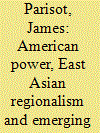

|
|
|
|
|
| Publication |
2013.
|
| Summary/Abstract |
Recent years have seen a revival of discussions on American decline. This paper intervenes in this debate by suggesting that there is a tendency towards partial conceptualisations of US power. It suggests a new historical materialist perspective that makes it possible to theorise American Empire as a relational social totality embedded within global capitalism. The paper then analyses the social limits of China's rise and the integration of East Asian regionalisation into American Empire, suggesting the extent to which world power has shifted east has tended to be overestimated. It also analyses the emergence of Brazil, India, and the brics meetings, suggesting these developments have a limited, but overstated, capacity to challenge American Empire.
|
|
|
|
|
|
|
|
|
|
|
|
|
|
|
|
| 2 |
ID:
122835


|
|
|
|
|
| Publication |
2013.
|
| Summary/Abstract |
While it may be intuited that human trafficking is an ineluctable component of the child soldiering experience, very little research exists to illustrate the tangible connections between these two 'worst forms' of child labour. The extent to which common reception points for trafficked children-such as slave-owning households, religious boarding schools and brothels-double as profitable reservoirs for recruiting commanders remains entirely unknown. Likewise, despite the clear financial incentive that some erstwhile commanders might have to traffic their former child combatants into civilian slavery, the prevalence of such practice is unknown. The purpose of this article is to delineate some of the most conspicuous academic gaps pertaining to the intersection of child trafficking and child soldiering.
|
|
|
|
|
|
|
|
|
|
|
|
|
|
|
|
| 3 |
ID:
122681
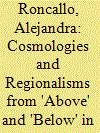

|
|
|
|
|
| Publication |
2013.
|
| Summary/Abstract |
Drawing on a Polanyian analysis of the land question, this article aims to analyse both Western and Indigenous cosmologies of Abya Yala-the name that indigenous peoples give to the American continent-to understand the relationship between human beings and land and nature. These cosmologies are at the heart of the way in which two distinct societies construct their regional space, one from 'above', the other from 'below', and they are therefore key to understanding today's climate change problématique. Following this nexus it is argued that, since the end of the Cold War, a new regional 'double-movement', unleashed by the quest for land and natural resources has been in the making. This is a superstructural or legal battle between Western transnational regime-making and a law that originated at the 'centre of the Earth'. The article explains both regionalisms and the dialectical interaction between them and demonstrates that Karl Polanyi's legacy remains relevant for the 21st century.
|
|
|
|
|
|
|
|
|
|
|
|
|
|
|
|
| 4 |
ID:
122831
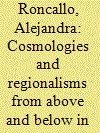

|
|
|
|
|
| Publication |
2013.
|
| Summary/Abstract |
Drawing on a Polanyian analysis of the land question, this article aims to analyse both Western and Indigenous cosmologies of Abya Yala-the name that indigenous peoples give to the American continent-to understand the relationship between human beings and land and nature. These cosmologies are at the heart of the way in which two distinct societies construct their regional space, one from 'above', the other from 'below', and they are therefore key to understanding today's climate change problématique. Following this nexus it is argued that, since the end of the Cold War, a new regional 'double-movement', unleashed by the quest for land and natural resources has been in the making. This is a superstructural or legal battle between Western transnational regime-making and a law that originated at the 'centre of the Earth'. The article explains both regionalisms and the dialectical interaction between them and demonstrates that Karl Polanyi's legacy remains relevant for the 21st century.
|
|
|
|
|
|
|
|
|
|
|
|
|
|
|
|
| 5 |
ID:
122837
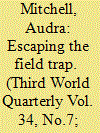

|
|
|
|
|
| Publication |
2013.
|
| Summary/Abstract |
There is a growing global demand for Northern universities to provide fieldwork opportunities in 'conflict zones' to students in applied International Relations (peace and conflict studies, post-conflict studies, human rights, development and related fields). This demand is generated in macro-level or structural dynamics emerging from three sources: the hiring criteria of major international organisations, competition between universities for fee-paying students and the social commodification of 'authentic' or 'real' life experience. At the micro level these dynamics can manifest themselves in exploitative relations, two of which are explored here. First, substantial inequalities (or a 'benefit gap') may arise between student researchers and their research subjects. Second, student researchers may find themselves in extractive relations with their research subjects. These dynamics lead to a situation in which some of the world's most vulnerable people are objectified as learning resources for students enrolled in (predominantly Northern) universities. The article argues that these dynamics are a problem of global politics, not just research ethics or pedagogy. It concludes with recommendations for reducing the potential for exploitation in educational fieldwork.
|
|
|
|
|
|
|
|
|
|
|
|
|
|
|
|
| 6 |
ID:
122834


|
|
|
|
|
| Publication |
2013.
|
| Summary/Abstract |
This article examines the modern day role and purpose of the UN Special Committee on Decolonization. Since its establishment in the 1960s the Committee has helped numerable former colonies achieve independence. Today, with very few 'colonised' Non-Self-Governing Territories remaining its work appears almost complete. However, serious flaws have always pervaded its decolonisation strategy; which are now more apparent than ever. The Committee retains narrow and outdated understandings of colonialism and, as a result, fails to recognise how widespread and pervasive global colonial forces remain. This makes its goal of universal decolonisation both unsatisfactory and misguided. The Committee's problematic approach towards decolonisation stems from its participation within the 'North-South Theatre', in which antagonism is perpetuated between the world's developed and less developed states. The paper argues that the Committee has not prioritised colonised peoples in the way it has always claimed, but instead worked principally in the interests of itself and its members.
|
|
|
|
|
|
|
|
|
|
|
|
|
|
|
|
| 7 |
ID:
122836


|
|
|
|
|
| Publication |
2013.
|
| Summary/Abstract |
Partnerships in international migration governance promise a cooperative approach between countries of origin, transit and destination. The literature has generally conceptualised migration partnerships as a policy instrument. This article suggests that understanding the broader transformations taking place in international migration governance under the rubric of partnership demands a novel analysis. Using a governmentality perspective, I interpret migration partnerships as an instance of neoliberal rule. Focusing on the convergence of international migration governance between the international realm and the European and North American region in particular, I demonstrate that the partnership approach frames international migration governance so as to enlist governments, migrants and particular experts in governing international migration, and invokes specific technologies of neoliberal governing which contribute to producing responsible, self-disciplined partners who can be trusted to govern themselves according to the norms established by the partnership discourse. The partnership approach is not a mere policy instrument; it goes beyond the European region and has become an essential element of the governance of international migration.
|
|
|
|
|
|
|
|
|
|
|
|
|
|
|
|
| 8 |
ID:
122833
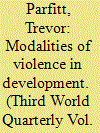

|
|
|
|
|
| Publication |
2013.
|
| Summary/Abstract |
This paper examines the relationship between violence and development. It explores whether violence is an intrinsic (structural) part of development, or a contingent result of poor or mistaken policies and practices that might be corrected. The issue of how far an element of violence might be desirable for development is also considered. These two issues are debated in the context of a variety of approaches to development and in light of various accounts of violence offered by analysts such as Fanon, Benjamin, Critchley and Zizek. In conclusion it is argued that an emancipatory conception of development may be reconciled with Benjamin's idea of divine violence in the form of a Badiouan event-with the proviso that the Derridian conception of the economy of violence is also applied in such a way as to minimise, or at least limit violence.
|
|
|
|
|
|
|
|
|
|
|
|
|
|
|
|
| 9 |
ID:
122838
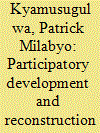

|
|
|
|
|
| Publication |
2013.
|
| Summary/Abstract |
In the past decade researchers and development experts have been preoccupied by participatory development and reconstruction. Despite criticisms of its potential, it has been at the centre of development practices. This review of both published and unpublished literature aims to assess the importance of participatory development and reconstruction, especially its positive and negative characteristics. The paper shows that, despite its potentially transformative role, its main drawback rests in the power relations between elites and non-elites and that creating comprehensible ways through which non-elites can deal with these relations is one issue that needs additional research. Other issues that need more research are related to how to sustain the participatory development and reconstruction outcomes by increasing local ownership, and how to better involve existing structures and institutions (both state and non-state actors) in development and reconstruction efforts for poverty alleviation.
|
|
|
|
|
|
|
|
|
|
|
|
|
|
|
|
| 10 |
ID:
122839
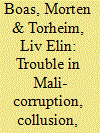

|
|
|
|
|
| Publication |
2013.
|
| Summary/Abstract |
The combined force of the 2012 coup in Bamako and the rebellion in the north entailed an unmasking of Mali. What had been presented as a showcase of democracy, good governance, and peace and reconciliation proved to be a facade for institutional weakness and mismanagement. The collusion between regional and national 'big man' interests that the crisis revealed showed little if any respect for human security and development. This article will analyse the causes of the crisis and the strategies of key actors, including the Islamist rebels. The consequences of and responses to the conflict will also be addressed before the article ends with some tentative conclusions concerning the future stability of Mali and the Sahel region. The article is based on the authors' long engagement with Mali, spanning more than a decade, but the most recent material presented is based on a series of in-depth interviews conducted there in February and March 2013.
|
|
|
|
|
|
|
|
|
|
|
|
|
|
|
|
| 11 |
ID:
122840


|
|
|
|
|
| Publication |
2013.
|
| Summary/Abstract |
Pakistan is the fastest urbanising country in South Asia, and the world's sixth most populous country, with a projected population of 335 million by 2050, and an annual urbanisation rate of 3.06%. Simultaneously it is undergoing a demographic transition to a youthful country and is experiencing the growth of rapidly expanding primary (megacities, like Karachi) and secondary (smaller towns) urban centres as a result of rural-urban migrations. This paper uses refereed literature and expert interviews to explore the drivers of urbanisation, and the social and, particularly, political consequences and potential impacts the phenomenon in Pakistan. Focusing on the impact of urbanisation on electoral politics, one predicted key driver of change will be the ability of politicians to satisfy the younger, more educated population's desire for improved public services, employment and social justice.
|
|
|
|
|
|
|
|
|
|
|
|
|
|
|
|
|
|
|
|
|